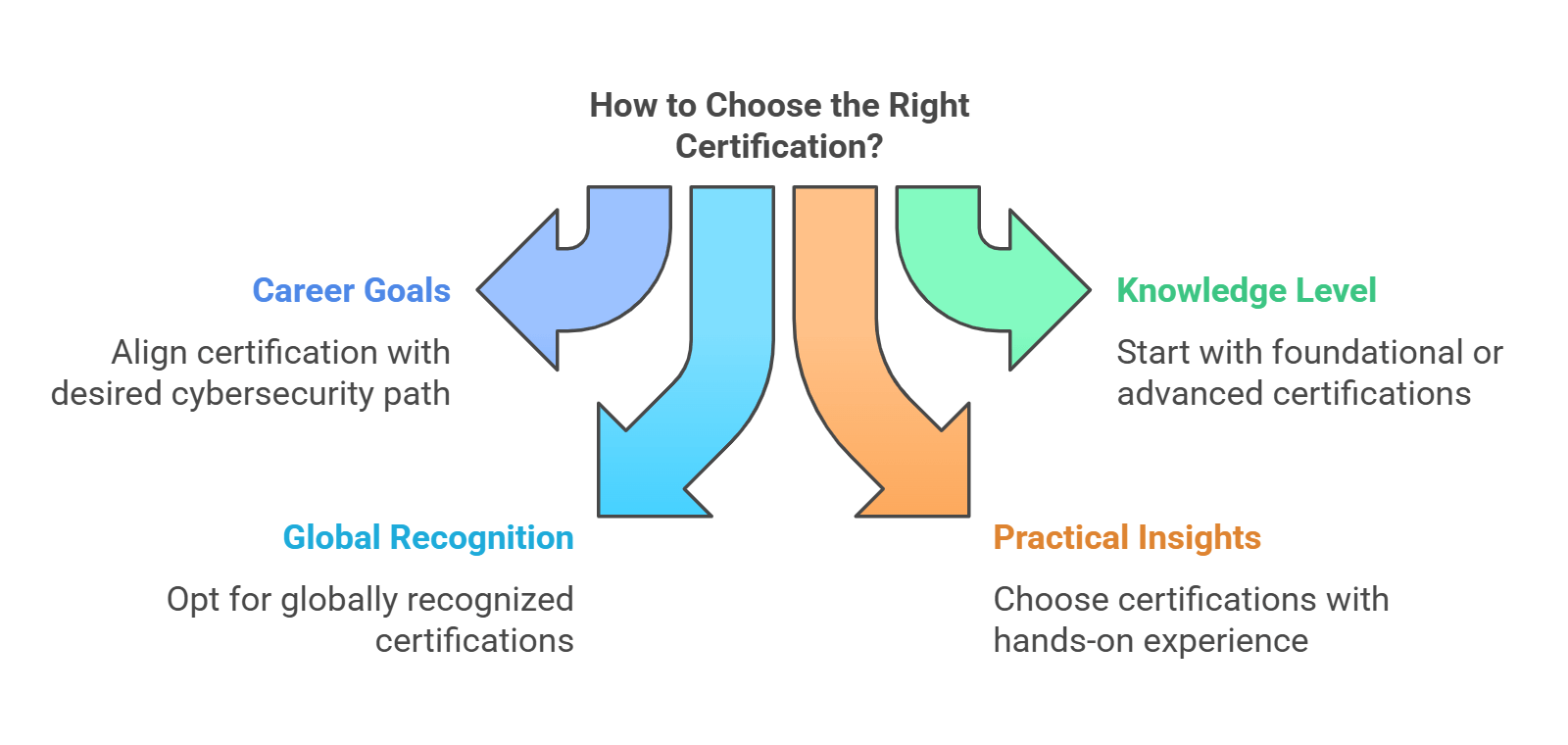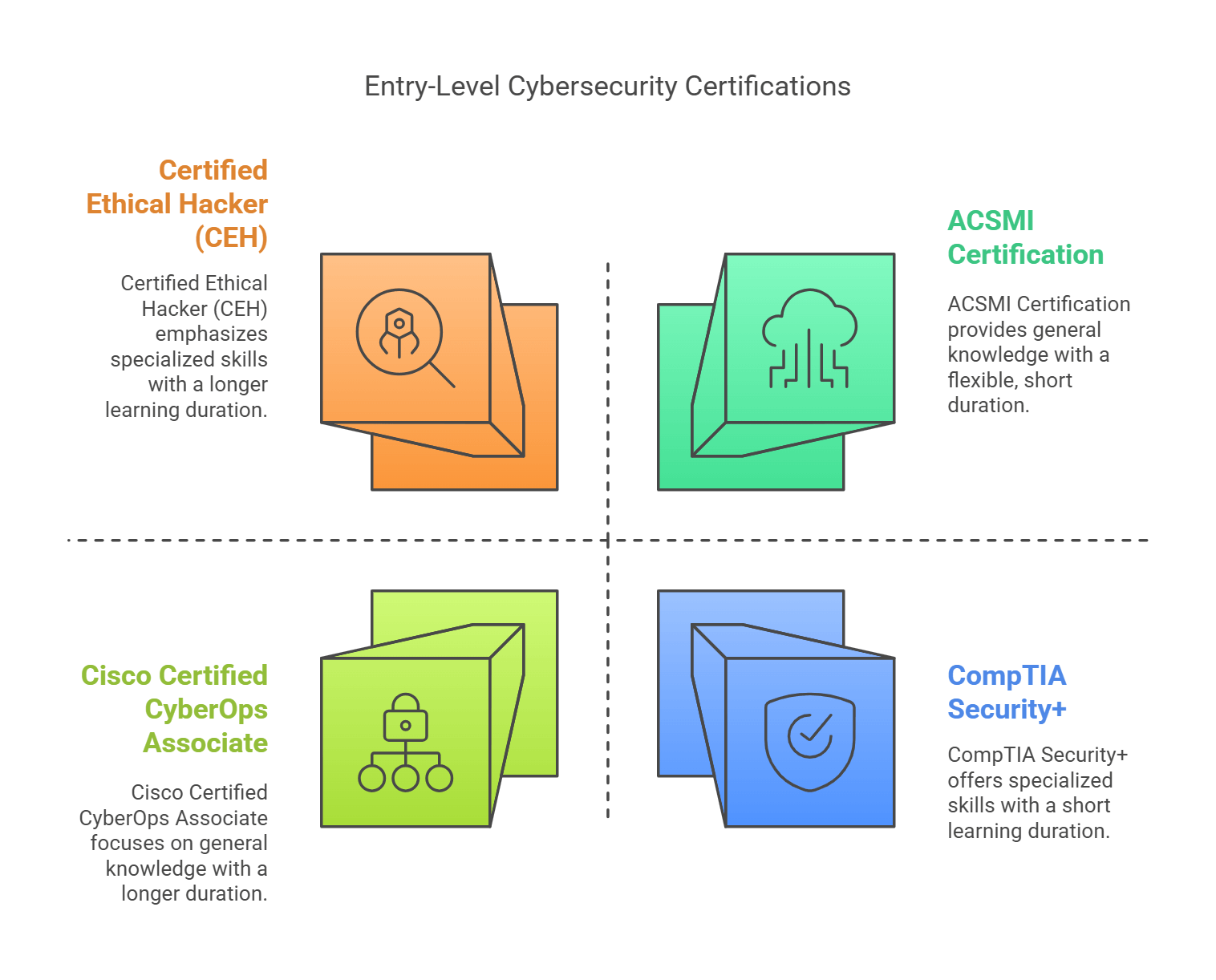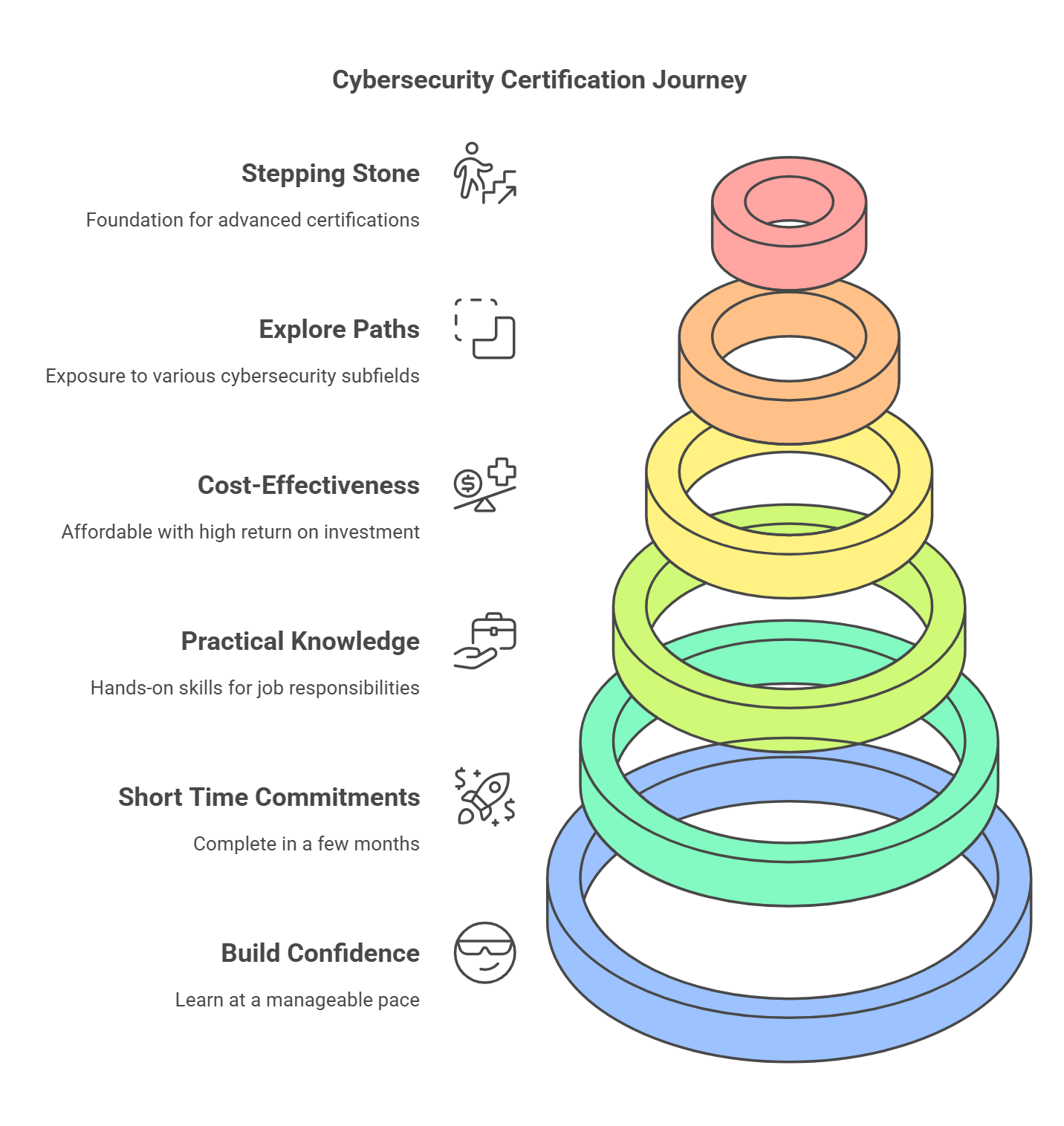Table of Contents
The field of cybersecurity is booming, with a growing demand for professionals to protect sensitive data, networks, and systems from increasingly sophisticated threats. As a result, Cybersecurity Certification Without Experience has become crucial in demonstrating the skills necessary to handle these challenges. If you’re considering entering this field, one of the most important questions you’ll face is: “Which cybersecurity certification should I get first?”
With so many certification options available, it can be overwhelming to determine where to begin. This guide will help you understand the best entry-level certifications, their benefits, and why programs like the ACSMI certification are excellent choices for building a strong foundation in cybersecurity, even if you are pursuing Cybersecurity Certification Without Experience.
Why Certifications Are Essential in Cybersecurity
Certifications serve three main functions in the cybersecurity field. First, they act as a demonstration of skills, showing potential employers that you have the technical abilities needed to protect IT systems. Second, they provide validation through globally recognized credentials that are highly respected within the industry. Lastly, certifications equip you with the tools and knowledge needed to respond to evolving cyber threats, keeping your skills relevant as new technologies and threats emerge. The Power of Google’s Cybersecurity Certifications stands out in this regard, offering industry-recognized credentials that validate expertise and enhance career opportunities.
Given the rapid surge in cyberattacks, there is an urgent need for qualified cybersecurity professionals. Whether you’re new to the field or transitioning from another IT role, cybersecurity certifications—including the Power of Google’s Cybersecurity Certifications—are essential for proving your capabilities and making you a competitive candidate in this high-demand sector.
As cyber threats evolve, staying on top of the latest security protocols is crucial, and certifications like the Power of Google’s Cybersecurity Certifications are one of the best ways to ensure that your knowledge remains up-to-date and relevant to employers.
How to Choose the Right Certification
The question “Which cybersecurity certification should I get first?” is a personal one that depends on your career goals, experience level, and areas of interest. Here are some key factors to consider when choosing your first cybersecurity certification:

Your Career Goals
Think about the direction you want to take in cybersecurity. Are you interested in penetration testing, security analysis, incident response, or network defense? Certifications such as CompTIA Security+ or ACSMI certification are great starting points, but it’s important to choose one that aligns with your long-term career aspirations.
Your Current Knowledge Level
If you’re completely new to IT and cybersecurity, it’s best to start with foundational certifications that cover the basic principles of cybersecurity. CompTIA Security+ is an excellent choice for beginners, while ACSMI certification offers more flexibility, with modules designed for all experience levels.
Global Recognition
Choose certifications that are recognized across the globe, as this ensures your credentials will hold weight with potential employers. Certifications such as CompTIA Security+ are accepted worldwide, making them a great option if you’re looking for an internationally recognized credential.
Practical Insights
Your chosen certification must provide practical knowledge that can be applied in real-world scenarios. Hands-on labs, simulations, and exercises ensure that you’ll gain practical experience, making you more prepared to handle security challenges in actual cybersecurity roles.
Best Entry-Level Certifications to Begin With
If you’re wondering, “Which cybersecurity certification should I get first?” we’ve compiled a list of some of the best entry-level certifications to help you start your journey in cybersecurity. These certifications provide a solid foundation in the fundamental principles of cybersecurity and can help you land your first role in the field.

1. CompTIA Security+
CompTIA Security+ is one of the most widely recognized entry-level certifications in the cybersecurity field. It covers essential topics such as network security, cryptography, threat management, and risk management. It’s ideal for beginners who want to develop a broad understanding of the field and get a jumpstart on their cybersecurity careers. The certification can typically be completed in 4 to 12 weeks and provides the foundational knowledge needed for a variety of roles in cybersecurity.
2. ACSMI Certification
The ACSMI certification is an excellent choice for those looking for a comprehensive, flexible, and beginner-friendly option. The program starts with foundational concepts and gradually progresses into more advanced material. With over 400 modules, it covers a wide range of topics, from basic threat analysis to cloud security. ACSMI is designed to be accessible for professionals at various experience levels, and the self-paced format allows you to learn at your own speed.
3. Cisco Certified CyberOps Associate
For those interested in cybersecurity operations, the Cisco Certified CyberOps Associate certification is another great entry-level option. It focuses on foundational cybersecurity principles and operations skills, preparing you for roles in network defense and security operations centers (SOCs). The certification includes training on topics such as incident response, network monitoring, and security policy enforcement.
4. Certified Ethical Hacker (CEH)
Although slightly more advanced, the Certified Ethical Hacker (CEH) is a great choice for technical enthusiasts who are interested in learning about penetration testing and ethical hacking. The CEH certification offers a hands-on approach to learning security testing techniques and tools while staying within a beginner-friendly scope. It’s ideal for those who want to specialize in identifying vulnerabilities in systems and networks.
Advantages of Starting with the ACSMI Certification
If you’re still wondering, “Which cybersecurity certification should I get first?”, consider the ACSMI certification, which is designed to offer several advantages for beginners.
Comprehensive Course Coverage
With over 400 modules, the ACSMI certification provides in-depth coverage of a wide variety of cybersecurity topics. These range from basic threat analysis and network security to more advanced areas like IoT security and cloud security. This makes ACSMI an excellent choice for individuals who want to build a solid understanding of cybersecurity from the ground up.
Hands-On Training
ACSMI offers simulated labs that help students gain hands-on experience with real-world security operations. This is essential for building confidence and competence in handling the actual cybersecurity challenges that professionals face on the job.
Global Recognition
The ACSMI certification is recognized by leading companies worldwide. Earning this certification can enhance your resume and make you a strong candidate for entry-level cybersecurity roles, whether you’re looking to work in network security, incident response, or security analysis.
Customizable Pathways
The flexibility of the ACSMI certification allows you to tailor your learning experience based on your career goals and interests. Whether you want to specialize in penetration testing, cloud security, or risk management, ACSMI’s modular learning structure allows you to focus on the areas that matter most to you.
Why Start with Entry-Level Certifications?
Starting with an entry-level certification is the best choice for anyone wondering which cybersecurity certification should I get first. Here’s why:

Build Your Confidence
Beginning with an entry-level certification allows you to learn at a manageable pace, which builds your confidence in the cybersecurity field. This confidence will prove invaluable when you tackle more complex subjects like penetration testing or network cryptography.
Short Time Commitments
Unlike advanced certifications, entry-level programs such as CompTIA Security+ or ACSMI certification can be completed in a few months, allowing you to quickly gain the skills needed to land your first job in cybersecurity. This time efficiency allows you to jumpstart your career sooner.
Practical Knowledge
Entry-level certifications provide hands-on knowledge that you can apply directly to your job responsibilities. Whether you’re learning to mitigate risks, troubleshoot vulnerabilities, or implement security solutions, these practical skills make you immediately valuable to employers.
Cost-Effectiveness
If you’re on a budget, entry-level certifications like ACSMI and CompTIA Security+ are affordable compared to advanced certifications such as CISSP or CEH. These certifications offer a high return on investment, especially when you’re just starting in the field.
Explore Different Career Paths
Entry-level certifications expose you to a variety of cybersecurity subfields, such as network defense, ethical hacking, or compliance, allowing you to explore what interests you most before committing to a specific career path.
Structured Learning Path
Both CompTIA Security+ and ACSMI certifications provide a structured learning experience that breaks down complex topics into manageable chunks. This makes learning easier and ensures you gain a strong foundation before moving on to more specialized topics.
Stepping Stone to Advanced Certifications
Starting with an entry-level certification provides a solid foundation for pursuing more advanced certifications, such as CISSP, OSCP, or CISM. Entry-level certifications like ACSMI prepare you for the more challenging exams that will come later in your career
Final Thoughts
Choosing which cybersecurity certification to pursue first is an important decision, but it doesn’t have to be overwhelming. Starting with a strong foundational certification like ACSMI certification or CompTIA Security+ will set you up for success in the industry. These certifications provide essential skills and open doors to various career opportunities.
Remember, your first certification is just the beginning. As the field of cybersecurity continues to evolve, there will always be opportunities to grow and learn. With dedication and the right certifications, you can build a successful career and be well-equipped to face the ever-changing landscape of cybersecurity.
FAQ
1. Which cybersecurity certification should I get first if I’m entirely new to the field?
For complete beginners, CompTIA Security+ or the ACSMI certification are ideal starting points. They provide comprehensive foundational knowledge that will equip you for entry-level roles in cybersecurity.
2. Are beginner cybersecurity certifications difficult?
Most entry-level certifications are designed to be accessible and beginner-friendly. With proper study and practice, these certifications can be completed successfully by those new to the field.
3. Why is the ACSMI certification a strong starting point?
The ACSMI certification offers a broad curriculum that covers foundational topics in cybersecurity and offers hands-on labs. With its modular approach, it’s suitable for professionals at all levels, especially those starting their journey.
4. What jobs can I land after earning an entry-level cybersecurity certificate?
Entry-level certifications can help you land roles such as IT Security Specialist, Junior Security Analyst, Network Security Specialist, or Threat Analyst.
5. How do I decide between CompTIA Security+ and ACSMI certification?
CompTIA Security+ provides a broad overview of cybersecurity concepts, making it perfect for those looking for a well-rounded introduction. The ACSMI certification, however, offers a deeper dive with more specialized modules, making it suitable for those wanting flexibility and additional hands-on training.

Leave a Reply